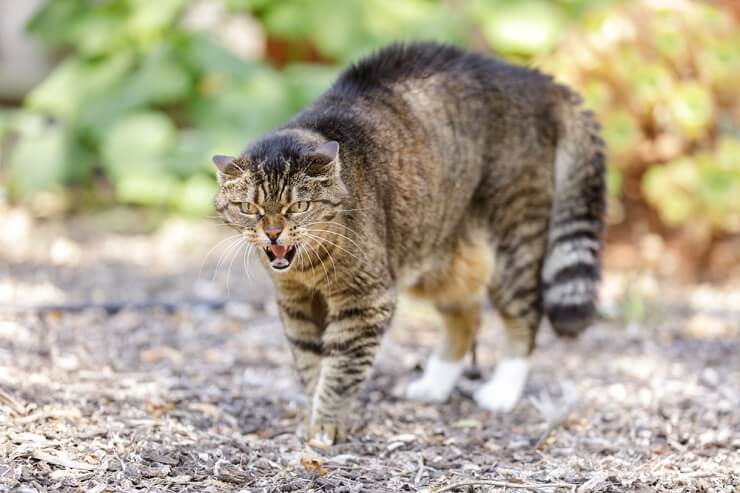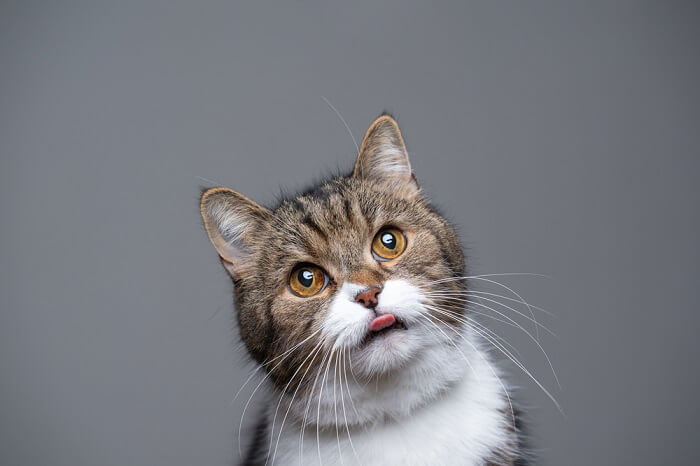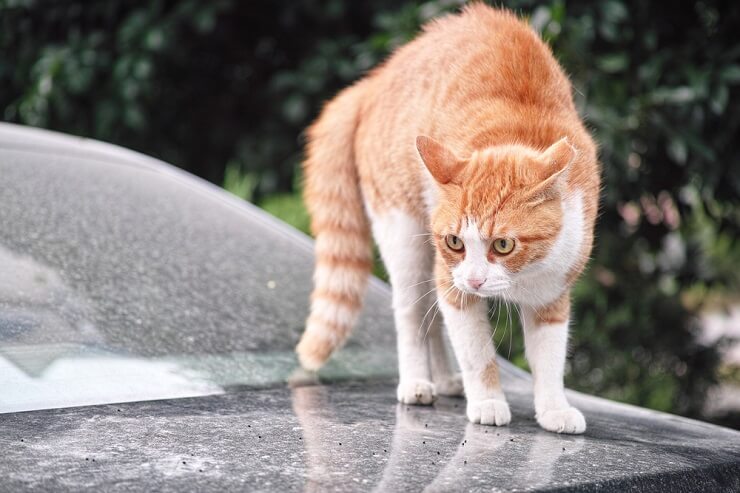Cat Growling Explained: Why your Cat Growls And Hisses
This page contains affiliate links. We may earn money or products from the companies mentioned in this post through our independently chosen links, which earn us a commission.
As a cat parent, you get used to your cat’s signature sounds.
For example, my cat Simba will hiss when he is in pain, meow loudly when he is hungry, and of course, my favorite – purr when he’s relaxing on my lap.
But I have also heard Simba growl on several occasions, especially just before a hiss.
And as a cat lover, you may also have encountered instances where your furball suddenly changes from cuddling to hissing and growling at you or another pet. This switch from friend to foe may leave you wondering the reason behind your cat‘s sudden growling behaviour.
There are several reasons why your cat may growl and hiss at you or another person. So, let’s look at each of them in detail, shall we?
1. It’s A Warning To Keep Off
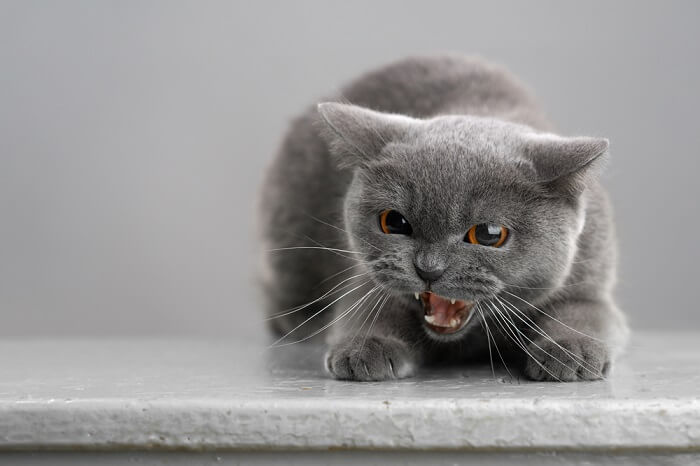
When you hear that deep growl followed by a hiss from your furry friend, it’s a sure sign that you should back off.
Look out for other warning signs from your cat that suggests she wants to be left alone. For instance, signs such as an angry stance, a raised tail, or an arched back indicate aggression. Some cats will do this when they are fed up of playing or being touched, and will suddenly shut things down with a change in mood.
You may instinctively want to touch and soothe your cat to try and calm her down when she is growling at you.
However, this is highly unadvisable.
Touching your furball when they are in such a state will only make the situation worse and may even make your cat more aggressive. Just quietly leave the room and give your cat some time to calm down.
2. When Scared Or Stressed
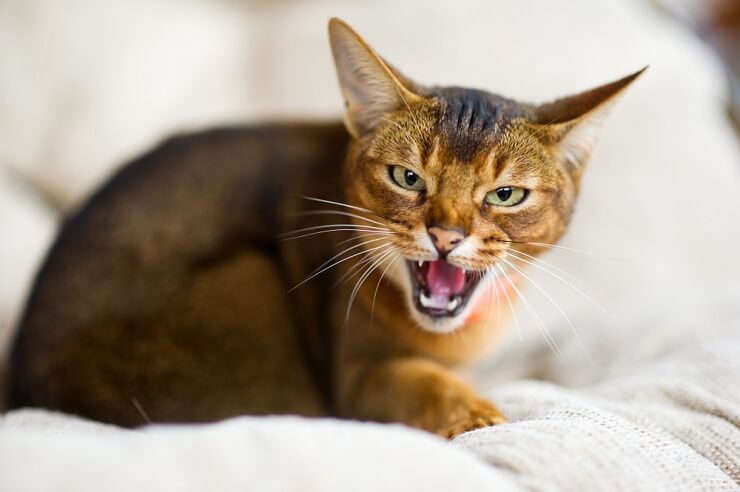
Your kitty’s growl is not always a sign of aggression.
Your cat may also growl when they are scared. Unfamiliar animals, environments or people can make your furball feel fearful or unsafe.
They may let out scary growling and hissing sounds to alert you that they’refeeling anxious.
In such a situation, try to move the stressor away. Your cat should calm down once whatever is worrying him has been moved out of sight.
If it’s impossible to move the stressor from your feline’s environment, gradually expose your cat to the scary person or item for short periods of time while giving them something they enjoy, like a treat or a toy. Positive reinforcement will help your cat overcome the fear they may have of the object. You can also show your cat fun hiding places if they’re scared of something like a new pet in your home.
3. It’s A Show Of Might Or Dominance
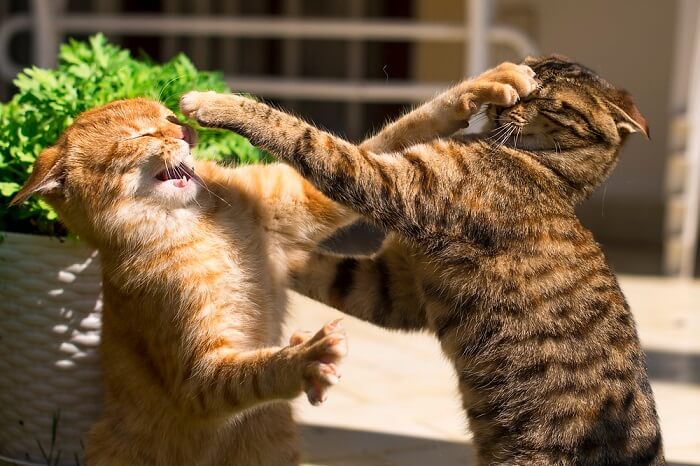
Cats are territorial creatures by nature, so they may want to express their dominance when they are in their territory. Male cats will often growl at each other for this reason.
. Your cat may also growl at other pets or people to protect his territory.. They may do this when another animal enters the room, letting them know who is boss!
And although cats don’t like to fight, the growling, hissing and standoff, may eventually turn into a physical fight until the other pet backs down
4. When In Pain
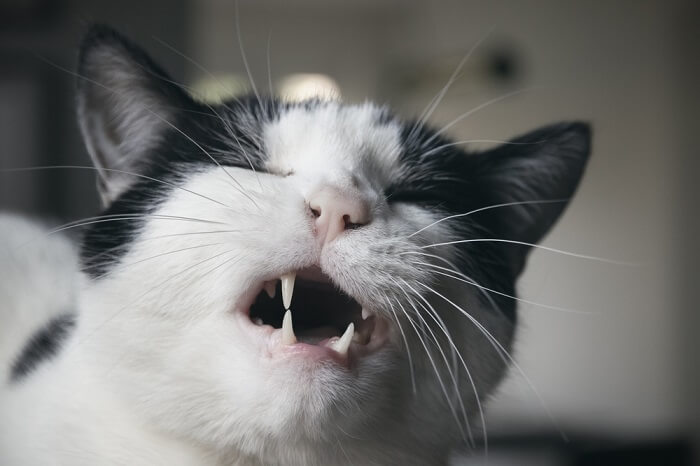
If your cat has an injury or has an ailment like a urinary tract infection, a dental issue or arthritis, they may growl or cry out in pain.
The growling and hissing will often happen if you try to touch the injured or painful area.
If you notice that your cat persistently growls and hisses when you touch them on specific areas of their body, it’s always wise to see a vet to rule out any ailments.
Other behaviours that may suggest that your cat is in pain include:
- Repetitive biting and licking a particular body part
- Loss of appetite
- Inability to walk or stand, panting, or walking like she is in pain
- Restlessness or being less active
- Dilated pupils
- A messy coat due to your cat’s inability to groom herself
5. Feeling Possessive
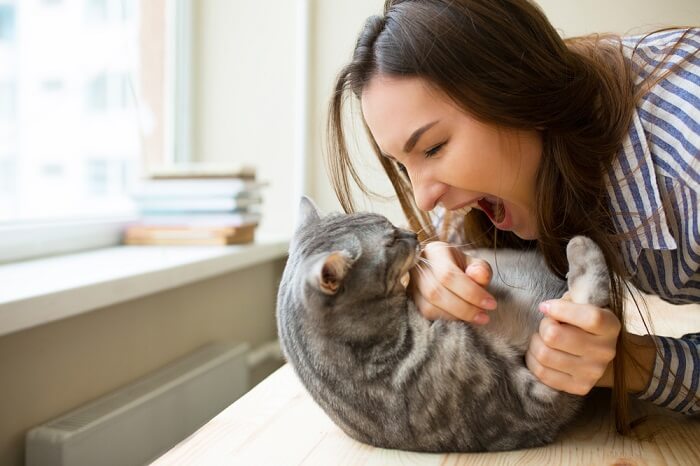
Have you ever tried to get near a mother cat with her kittens, and then she let out a growl followed by a hiss? Well, this is typical cat behaviour, especially one who wants to show possessiveness and is protecting her babies.
Cats also growl when they want to show possession of food or other personal items. Your furball may hiss and growl if they feel like you want to take something that belongs to them away.
To try and avoid conflict in the house over possessions, make sure that there are plenty of resources available. There should be a litter tray per cat, separate feeding areas and plenty of comfy beds.
6. When Angry
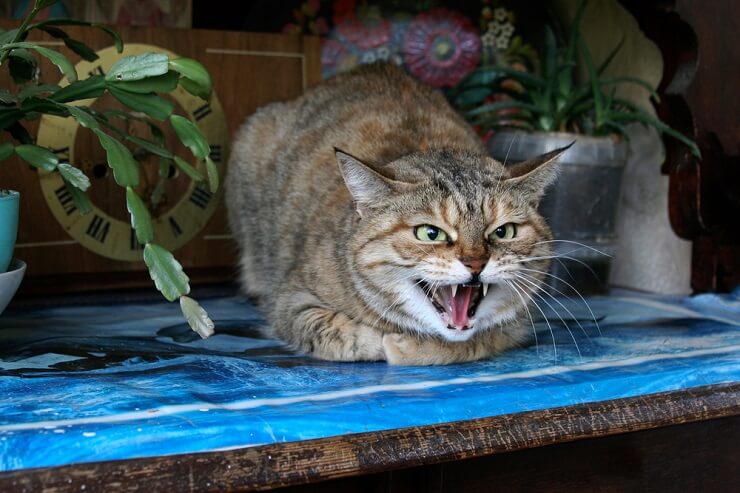
When felines get annoyed, they can get very aggressive.
An angry cat will do more than hiss and growl at you. Your furball will expose her teeth and may bite or scratch you. An angry cat will also have constricted pupils, pointed ears, and a crouched stance.
If you notice your feline is hissing at you because she is angry, don’t ignore her. Slowly leave the room or back awayto allow the cat to calm down. Ignoring your cat or continuing to do what’s making her angry may prompt her to scratch or bite you.
Conclusion
In closing, cats growl due to various reasons. Hopefully, now you know what to look out forand some of the steps you can take to reduce the frequency of this occurring. .
We’d love to hear from you. So, let us know if you have a cat that growls and what you have done to help curb this behaviour.
Frequently Asked Questions
What does it mean when a cat does a low growl?
A cat may do a low, slow growl that may escalate to a full growl. It often starts with an “mmmm” sound and then turns to a low long gruff before escalating to a long guttural growl.
If you hear your cat making the low growl, it means that your cat is annoyed, stressed or unhappy, and she’s warning you to back off.
What does it mean when a cat is growling?
Growling may mean that your cat is frightened, angry, irritated or stressed. At times, a cat’s growl may mean that she is sick or in pain. When an old cat growls, it could also mean that she is disoriented or confused.
Why is my cat growling and acting weird?
Your cat may just be overstimulated. When cats are overstimulated and fed up with being touched, they might growl, bite, scratch, or show their teeth. This is their way of telling you to back off and that they’ve had enough. This may appear as weird behaviour since your cat might have looked like she was enjoying playing with you just a couple of minutes earlier!.
Another reason could be that your cat is being defensive. A defensive cat will be in a crouched position, tail wrapped between her legs, ears flattened, and her whiskers pulled back. They might also spit and hiss at the perpetrator.
How can you calm a growling cat?
When your cat is growling, the best advice is to leave the cat alone. Trying to touch or talk to your feline will only escalate the aggression. The best way to calm them is by simply leaving the room. You might also consider taking away any other object, animal or person that is making your pet feel stressed, frightened, or threatened.

